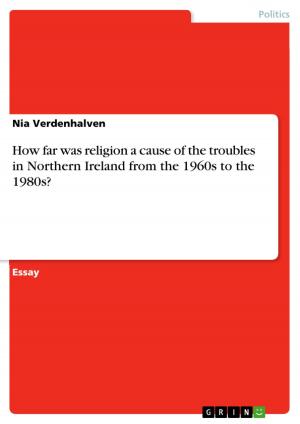Roles of the Organs and Officers of an Incorporated Company
Business & Finance, Management & Leadership, Management| Author: | Okechukwu Dominic Nwankwo | ISBN: | 9783668318090 |
| Publisher: | GRIN Publishing | Publication: | October 11, 2016 |
| Imprint: | GRIN Publishing | Language: | English |
| Author: | Okechukwu Dominic Nwankwo |
| ISBN: | 9783668318090 |
| Publisher: | GRIN Publishing |
| Publication: | October 11, 2016 |
| Imprint: | GRIN Publishing |
| Language: | English |
Project Report from the year 2016 in the subject Business economics - Business Management, Corporate Governance, , course: LAW, language: English, abstract: This is a research work on the 'roles of the organs and officers of an incorporated company'. In it, the organs are identified as the General Meeting (shareholders), and the Board of Directors, while the officers are identified as the directors, secretary, auditor, legal adviser. The company's organs take the key critical resolutions cum decisions that sway the company for better or worse. And these resolutions cum decision are implemented through corporate management or governance by the officers of the company. As legal personality, the company has a separate existence from the founders. Yet it is operated by human beings. The company functions through its Memorandum and Articles of Association, which can be altered through resolution passed by the majority of the company members at the General Meeting. Similarly, the company's performance is also regulated by other statutory law, for example the Companies and Allied Matters Act, otherwise known as CAMA. Most of the company's officers are appointed by the Board of Directors. However, this is subject to confirmation at the General Meeting. Consequently, as a going concern/business, the company is prosperous when there is a healthy relationship between the organs, and officers, and particularly between the General Meeting (Shareholders), and the Board of Directors. Though the General Meeting works by the resolutions passed by the majority members, yet there are exceptions to this when the court enforces an individual member(s) action against the majority's decisions. This is an exception to the rule in Foss V Harbottle. The aim is to check fraud and ultra vires activities in the company. To be valid, an officer's acts shall be done in good faith, diligently, and with care; and the company shall hold the officer liable for such acts. Essentially, the common law held the view that company's officers owed their services to the company only, and not individual shareholders. However, this position has been rejected by the modern company practice and knowledge. Hence, the roles of the contemporary company officers have been enlarged to embrace serving the company which employees them, the individuals shareholders under relevant circumstances, as well as the generality of the public that benefits or is affected by the activities of the company. Fundamentally, company practices in Nigeria are bedeviled by the apathy of the stakeholders in corporate governances, except when there is a selfis
Project Report from the year 2016 in the subject Business economics - Business Management, Corporate Governance, , course: LAW, language: English, abstract: This is a research work on the 'roles of the organs and officers of an incorporated company'. In it, the organs are identified as the General Meeting (shareholders), and the Board of Directors, while the officers are identified as the directors, secretary, auditor, legal adviser. The company's organs take the key critical resolutions cum decisions that sway the company for better or worse. And these resolutions cum decision are implemented through corporate management or governance by the officers of the company. As legal personality, the company has a separate existence from the founders. Yet it is operated by human beings. The company functions through its Memorandum and Articles of Association, which can be altered through resolution passed by the majority of the company members at the General Meeting. Similarly, the company's performance is also regulated by other statutory law, for example the Companies and Allied Matters Act, otherwise known as CAMA. Most of the company's officers are appointed by the Board of Directors. However, this is subject to confirmation at the General Meeting. Consequently, as a going concern/business, the company is prosperous when there is a healthy relationship between the organs, and officers, and particularly between the General Meeting (Shareholders), and the Board of Directors. Though the General Meeting works by the resolutions passed by the majority members, yet there are exceptions to this when the court enforces an individual member(s) action against the majority's decisions. This is an exception to the rule in Foss V Harbottle. The aim is to check fraud and ultra vires activities in the company. To be valid, an officer's acts shall be done in good faith, diligently, and with care; and the company shall hold the officer liable for such acts. Essentially, the common law held the view that company's officers owed their services to the company only, and not individual shareholders. However, this position has been rejected by the modern company practice and knowledge. Hence, the roles of the contemporary company officers have been enlarged to embrace serving the company which employees them, the individuals shareholders under relevant circumstances, as well as the generality of the public that benefits or is affected by the activities of the company. Fundamentally, company practices in Nigeria are bedeviled by the apathy of the stakeholders in corporate governances, except when there is a selfis















